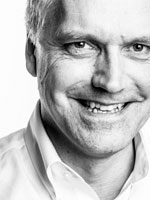 |
John Aunins, PhD
Executive Vice President of Bioprocess Development, Seres Health
John Aunins is a 24-year veteran in the biotech field, with deep experience in bioprocess development, manufacturing support, and project leadership. He led process and product development teams at Merck Research Laboratories for Vaqta®, Varivax®, Zostavax®, ProQuad®, Rotateq®, and Gardasil®. The Vaqta and Gardasil process teams were awarded with ACS Industrial Biotechnology Awards for innovation, contribution to bioengineering, and societal impact. He is a Fellow of the American Institute for Medical and Biological Engineering, and an adjunct Full Professor at the Instituto de Tecnologia Quimica e Biologica (ITQB) in Oeiras, Portugal. He is author of over 50 articles and book chapters, and has chaired five international conferences in vaccines and bioprocess technology. John obtained his PhD in Chemical Engineering from MIT in 1989 under Institute Professor Daniel C. Wang. |
 |
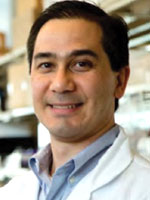 |
Dan Barouch, MD, PhD
Professor of Medicine, Harvard Medical School
Director, Center for Virology and Vaccine Research, Beth Israel Deaconness Medical Center
Dan Barouch, MD, PhD, is director of the Center for Virology and Vaccine Research at Beth Israel Deaconess Medical Center. He is also a professor of medicine at Harvard Medical School. In addition, he is a key part of the Bill & Melinda Gates Foundation Collaboration for AIDS Vaccine Discovery, the National Institutes of Health Center for HIV/AIDS Vaccine Immunology and Immunogen Discovery, and the Ragon Institute of MGH, MIT, and Harvard.
Dr. Barouch received his PhD in immunology from Oxford University and his MD from Harvard Medical School.
His laboratory focuses on studying the immunology and virology of HIV-1 infection and developing novel vaccine strategies. His laboratory has explored a series of novel vaccine technologies, including adjuvanted DNA vaccines, poxvirus vectors, and alternative serotype adenovirus vectors in both preclinical and clinical studies. In particular, he has advanced a series of novel adenovirus vector-based HIV-1 vaccine candidates from concept and design to preclinical testing to phase 1 clinical trials that are currently underway in both the US and sub-Saharan Africa.
Dr. Barouch is board certified in internal medicine and infectious diseases, and he is committed to mentoring students, clinical fellows, research fellows, and junior faculty and to providing clinical care to patients with infectious diseases. |
 |
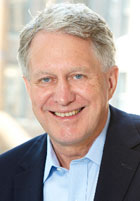 |
Barry C. Buckland, PhD
Visiting Professor, Department of Biochemical Engineering, University College London
Chief Executive Officer, BiologicB
PhD in Biochemical Engineering at University College London obtained in 1974. Joined the Merck Research Laboratories (MRL) in 1980 and built a world class Bioprocess R&D group. Leader of process development of all biologically made product candidates within the MRL pipeline and manufacture of Clinical Supplies during a 20 year time frame. Products developed within this period include MEVACOR®, ZOCOR®, IVOMEC®, CANCIDAS®, RECOMBIVAX HB®, VAQTA®, VARIVAX®, COMVAX®, ROTATEQ® (Rotavirus vaccine), ZOSTAVAX® (shingles vaccine) and GARDASIL® (HPV vaccine).
External awards and appointments include being elected to the National Academy of Engineering in 1997 and Fellow of University College London in 1998. Awards include the Donald Medal, UK Institute of Chemical Engineering in 2002, Prix Galien award: Member of team to receive Vaccine Award for Gardasil® in 2007, Merck Board of Directors Award for leading process development for licensure of four (4) new vaccines in 2007. Chaired two International Conferences on Cell Culture (Cell Culture Engineering IV and Cell Culture Engineering V) and co-chaired the first three International Conferences on Metabolic Engineering. Co-chaired the first two International Conferences on Vaccine Technology. Author or co-author of over 70 papers. Visiting Professor at University College London for past 15 years. In October 2008, named by AIChE as one of the “One Hundred Chemical Engineers of the Modern Era” (defined as from World War II to Present) as part of the AIChE Centennial Celebration in Philadelphia, USA and also awarded Marvin Johnson Award by ACS (American Chemical Society) for lifetime contribution to Biotechnology. Awarded PhRMA Discoverer of the Year award in April 2009 for development of the Merck HPV vaccine (along with Eliav Barr and Kathrin Jansen).
Starting in May 2009; CEO, BiologicB. Since this time have provided consultancy worldwide to a number of companies and not-for-profit institutions, in all areas of Biologics including Vaccines and Therapeutic Proteins. Member of Board of Directors for Ancora and Mucosis. Chair of Board for a not-for-profit organization, Engineering Conferences International. Continue as Visiting Professor at University College London. Founder and Board Member of start-up company Enumeral Biomedical. Head, Bioprocess Development at Protein Sciences. The first recombinant Shingles vaccine, Flublok, was licensed in January 2013. |
 |
 |
Dave Clark
Vice President, Global Technical Operations, AstraZeneca
Dave Clark is currently Vice President, Global Technical Operations at AstraZeneca Supply Biologics/Medimmune located in Gaithersburg, Maryland. Prior to that, he was Senior Director of Manufacturing Sciences and Technology at the AZ Frederick Manufacturing Center with responsibilities for technology transfer and manufacturing technical support. Dave has experience in the pharmaceutical industry in the areas of vaccines, recombinant proteins and small molecules process development, and clinical manufacturing. His industrial experience has been at the following companies: Janssen/J&J/Centocor, Wyeth Vaccines, Apollon (DNA vaccine company) and Life Technologies. Dave earned his PhD in Microbiology from Rutgers University and held a 2-year post-doctoral position at the Institute of Molecular Biology at the University of Zurich. |
 |
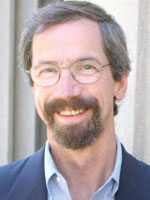 |
Charles L. Cooney
Robert T. Haslam (1911) Professor of Chemical Engineering, Emeritus, Department of Chemical Engineering; Faculty Director, Emeritus, Deshpande Center for Technological Innovation, Massachusetts Institute of Technology
Charles L. Cooney received his BS in chemical engineering from the University of Pennsylvania in 1966, and the SM (1967) and PhD (1970) in biochemical engineering from MIT. After a short post-doc at the Squibb Institute for Medical Research, he joined the MIT faculty as an assistant professor in 1970, becoming full professor in 1982.
Cooney’s honors include the 1989 Gold Medal of the Institute of Biotechnological Studies (London); the Food, Pharmaceutical, and Bioengineering Award from the American Institute of Chemical Engineers; the James Van Lanen Distinguished Service Award from the American Chemical Society’s Division of Microbial and Biochemical Technology; election to the American Institute of Medical and Biochemical Engineers and a Fellow of the American Chemical Society.
A consultant to multiple biotech and pharmaceutical companies, Cooney sits on the boards of Polypore International, Biocon, Ltd. (India) and multiple private companies (GreenLight Bioscience, Mitra Biotech, Pronutria Biosciences, Boyd Technologies, enEvolve, Inc., Levitronix). His research and teaching interests span many aspects of biochemical engineering and pharmaceutical manufacturing and accelerating technological innovation. |
 |
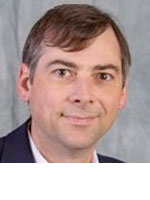 |
Geoffrey Hodge
Bioprocess Technology Leader, Co-founder Xcellerex, GEHC Life Sciences
Geoffrey Hodge is Bioprocess Technology Leader at GE Healthcare Life Sciences, based in Marlborough, Massachusetts, USA. He is responsible for providing bioprocess technical expertise for the Solutions Modality, a group dedicated to understanding the long-term goals and technical demands of GE Life Sciences' bioprocess customers and addressing their needs with the right combination of products and services from a broad portfolio of options.
Hodge is a co-founder of Xcellerex, a company specializing in single-use bioreactors, mixers and facilities, as well as PD and GMP manufacturing services using single-use biomanufacturing systems. He served as VP of Process Development and Manufacturing until Xcellerex was acquired by GE in 2012 and is inventor on several Xcellerex technology patents.
Prior to Xcellerex, Hodge was Associate Director of Process Development at Millennium Pharmaceuticals (now Takeda), Cambridge, MA, with responsibility for the process development and clinical manufacturing of Millennium's biologics pipeline. In this role he pioneered the use of single-use manufacturing systems for the production of monoclonal antibodies and helped to develop a novel manufacturing platform and many of the high-throughput process development technologies subsequently licensed to Xcellerex.
Hodge has also held positions in commercial manufacturing as Manufacturing Section Head at Genetics Institute (now Pfizer), Andover, Massachusetts, and various management positions in process development, clinical manufacturing, manufacturing and validation at Alpha-Beta Technology, Worcester, Massachusetts.
Hodge received his BA in Biology from Colgate University, and his MS in Biotechnology from Worcester Polytechnic Institute. |
 |
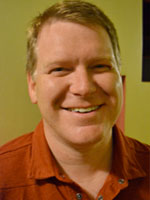 |
Darrell J. Irvine, PhD
Professor of Biological Engineering and Materials Science & Engineering, Massachusetts Institute of Technology
Darrell Irvine, PhD, is a Professor at the Massachusetts Institute of Technology and an Investigator of the Howard Hughes Medical Institute. He also serves on the steering committee of the Ragon Institute of MGH, MIT, and Harvard. His research is focused on the application of engineering tools to problems in cellular immunology and the development of new materials for vaccine and drug delivery. Current efforts are focused on problems related to vaccine development for HIV and immunotherapy of cancer. Dr. Irvine’s work has been recognized by numerous awards, including a Beckman Young Investigator award, an NSF CAREER award, selection for Technology Review’s ‘TR35’, election as a Fellow of the Biomedical Engineering Society, election as a fellow of the American Institute for Medical and Biological Engineering, and appointment as an investigator of the Howard Hughes Medical Institute. He is the author of over 100 publications, reviews, and book chapters and an inventor on numerous patents. |
 |
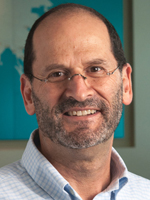 |
David C. Kaslow, MD
Vice President, Product Development and Interim Program Leader, Drug Development, PATH Product Development
David is a physician scientist with 25+ years of product development research and development experience, encompassing academic, government, private and non profit sectors. David joined PATH as the PATH Malaria Vaccine Initiative (MVI)’s as director in 2012 and became vice-president of PATH Product Development in 2013.
Prior to joining MVI, David was vice-president and head of vaccines project leadership and management at Merck Research Laboratories, where his responsibilities included oversight of clinical biomarkers and project leadership and management of Merck Vaccine’s pipeline. From 2001-2006, he was Chief Scientific Officer at Vical and for two years prior to that he was Senior Director of Virus and Cell Biology and Head of Vaccine Research and Technology at Merck Research Laboratories. From 1986-1999, he was Head of the Malaria Vaccine Section and founder of the Malaria Vaccine Development Unit in the intramural program at NIAID/NIH.
He received an MD degree from the School of Medicine at the University of California, San Francisco, and a Bachelor of Sciences degree in Biochemistry from the University of California, Davis. |
 |
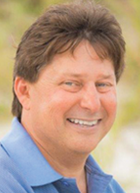 |
Stephen A. Kolodziej, PhD
Associate Research Fellow-Group Leader, Pfizer, Inc.
Steve has been an Associate Research Fellow in the Conjugation and Polytides Process Development group at the Pfizer-St. Louis site since 2010, where his team has focused on process development of polysaccharide-protein and other protein conjugates as biotherapeutic drug candidates for vaccine (prophylactic and therapeutic), oncology and cardiovascular indications. Prior to this position, he spent 16 years in the Discovery Medicinal Chemistry groups of Searle, Pharmacia, then Pfizer developing novel small molecule candidates as potential therapies for inflammatory diseases, as well as developing novel approaches to PK modulation via protein conjugation. Steve has a BA and a PhD in Organic Chemistry from the University of Missouri. |
 |
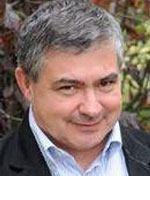 |
René Labatut, PhD
Vice President, Global Manufacturing Technology, sanofi pasteur
Dr. René Labatut, PhD, currently Vice President Manufacturing Technology, in the industrial development organization of sanofi pasteur. He has more than 25 years of worldwide experience in Biopharmaceutical industry including product and bioprocess technologies development at industrial scale notably vaccines technologies and engineering; technology transfer management; licensing in and out and innovation management.
He has held several positions in Research, Manufacturing, Industrial & Technology Development, Engineering and Industrial Operation Risk and Performance Management. |
 |
 |
J. Christopher Love, PhD
Professor of Chemical Engineering, Massachusetts Institute of Technology
J. Christopher Love is an associate professor in chemical engineering and member of the Koch Institute for Integrative Cancer Research at MIT. In addition, Chris is an associate member at the Eli and Edythe L. Broad Institute, and at the Ragon Institute of MGH, MIT, and Harvard. Dr. Love received his PhD in 2004 in physical chemistry at Harvard University. He extended his research into immunology at Harvard Medical School from 2004-2005, and at the Immune Disease Institute from 2005-2007. His research centers on using simple microsystems to measure and correlate multiple phenotypic and functional characteristics of individual lymphocytes, and from these single-cell data, generate quantitative, system-wide profiles of immune responses. Current areas of research in the lab include
i) multiplexed, functional profiling of lymphocytes from HIV+ patients,
ii) clonal analysis of autoreactive T cells and B cells in type 1 diabetes and multiple sclerosis, and
iii) development of quantitative, cell-based diagnostics for allergy testing.
In addition, his lab is understanding how to engineer microbial strains for manufacturing therapeutic antibodies. Dr. Love was named a Dana Scholar for Human Immunology and a Keck Distinguished Young Scholar in Medical Research in 2009, as well as one of Popular Science’s Brilliant 10 in 2010. Chris is also a Camille Dreyfus Teacher-Scholar. |
 |
 |
Tarit Mukhopadhyay, EngD
Lecturer, Department of Biochemical Engineering, University College London
Tarit is a lecturer in the Department of Biochemical Engineering at University College London. For the past ten years he has been working in the field of vaccine bioprocess development on a range of bacterial and virus vaccines. His early work with the Health Protection Agency, involved working on 2 vaccines of commercial interest, a novel Meningitis B vaccine based upon the outer membrane proteins of N.lactamica and the UK licensed Anthrax vaccine. In both cases scale-down tools were used to improve the manufacturing process of these vaccine and in the case of the anthrax vaccine, half the manufacturing time.
Since then his research targets include the upstream and downstream processing of conjugate vaccines and virus vectors such as adenovirus, AAV and lentivirus. These include thermo-stable formulation of lentiviruses, novel chromatographic separation techniques for AAV and high-cell density production of adenoviruses.
In 2014, Tarit joined the EU funded (FP7) FLUTCORE consortium to utilise virus like particles to create a universal influenza vaccine expressed in Pichia pastoris. The idea is to create a platform manufacturing process that is independent of antigen switching.
A main focus of his research is scale-down and scale-up. The primary methodology is to create scale-down models that mimic the processing environment to determine CQA/CPP that can be accurately applied to the commercial scale. The obvious benefits of this are reducing time to market and cost. |
 |
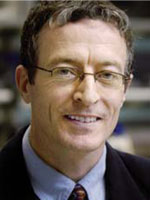 |
Derek O’Hagan
Global Head of Vaccine Chemistry & Formulation, GSK
Derek O’Hagan, BPharm, MRPharmS, PhD, is the Global Head of Vaccine Chemistry and Formulation for GSK, based in Cambridge, MA. He manages research teams both in Cambridge and Siena, Italy. He is a qualified pharmacist from the UK, and a former academic researcher, who has worked on vaccine delivery in the industry since 1993. He was formerly a Lecturer in Drug Delivery at the Department of Pharmaceutical Sciences, University of Nottingham, UK, and received research funding from the World Health Organization, The Wellcome Trust and the Medical Research Council. He was recruited into the US in 1993, and moved to progress basic research into clinical evaluation. He subsequently worked on several vaccine delivery systems that were evaluated in the clinic, including novel adjuvants, nucleic acid vaccines and needle free vaccines. In the mid 1990’s, he worked on the novel emulsion adjuvant MF59, which is now included in a licensed flu vaccine in more than 40 countries and is progressing towards licensure in the US. He is the author of >120 original research publications, >60 book chapters and reviews and is a named inventor on >50 filed patents. He was awarded the Conference Science medal of the Royal Pharmaceutical Society of Great Britain in 1997, and the Young Investigator Research Achievement Award of the Controlled Release Society in 1999. He was also named as the ‘most inventive scientist’ in Chiron in 2004 and was the lead author on the most cited paper in ‘Vaccine’ 2008-10. He has served on the Board of Scientific Advisors for the Controlled Release Society and is a Fellow of the American Association of Pharmaceutical Scientists. |
 |
 |
Katey Owen
Deputy Director, Vaccine Development CMC, Bill and Melinda Gates Foundation
Dr. Katey Einterz Owen is the Deputy Director for Vaccines Development (CMC) at The Bill & Melinda Gates Foundation. Her responsibilities include manufacturing and bioprocess R&D across the complete portfolio of vaccine investments that the foundation supports, including vaccine candidates against polio, pneumonia, enteric and diarrheal diseases, HIV, malaria, TB, and neglected infectious diseases. She joined B&MGF in 2013 as a seasoned pharmaceutical industry leader with demonstrated success in vaccine development, manufacturing, and commercialization across a portfolio of vaccines at Merck. Katey combines a technical end-to-end view of product development and manufacturing with a commercial understanding of the for-profit pharmaceutical business. Her perspectives have also been shaped by her oldest sister, who is a primary care physician and health-district chief in rural northern Cameroun. Prior to joining the pharmaceutical industry, Katey carried out academic research on influenza at the National Institute for Medical Research in Mill Hill (London). She earned her PhD in molecular virology from Purdue University. In addition to her professional mission of making life-saving vaccines available to the world, Katey and her husband James happily welcome any outdoor activities they can manage with their four children. |
 |
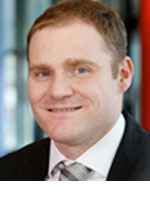 |
Alain Pralong, PhD
Vice President, New Product Introduction and Technical Life Cycle Management, GlaxoSmithKline Vaccines
Alain Pralong obtained his doctorate in molecular and cellular biology at the University of Berne in 2000. His research into apoptosis was conducted jointly between the University and Novartis, where all laboratory-based investigations were carried out. From 2000 to 2004 he worked on manufacturing Adenovaccine clinical trial material at Schering-Plough. Following a move to Roche in 2004, he managed their transfer of Avastin process manufacturing from Genentech. From 2007 to 2008, he worked at Merck-Serono in the manufacturing of hormones used in treatment of infertility. Since 2008, Alain has been Vice President at Crucell where he led the Global Process Development Department working on various monoclonal antibodies and vaccines until the take over of Crucell by Johnson & Johnson in 2011. Alain worked then worked ad interim as consultant for Pharma-Consulting ENABLE GmbH. Since November 2011, Alain works at GSK Biologicals in Belgium as Vice President for New Product Introduction. |
 |
 |
Robin Robinson, PhD
Director of the Biomedical Advanced Research and Development Authority (BARDA)
Deputy Assistant Secretary for Preparedness & Response
U.S. Department of Health and Human Services
Dr. Robin Robinson was appointed in April 2008 as the first director of the newly, created federal agency, Biomedical Advanced Research and Development Authority (BARDA), and Deputy Assistant Secretary in the Office of the Assistant Secretary for Preparedness and Response within HHS by the Pandemic and All-Hazards Preparedness Act of 2006. BARDA develops and provides medical countermeasures to man-made and natural threats including chemical, biological, radiological, and nuclear threats, pandemic influenza, and emerging infectious diseases. BARDA meets this mission by supporting product innovation, advanced development, acquisition and stockpiling, and building manufacturing infrastructure. Dr. Robinson led the nation’s effort to develop and manufacture the largest amount of vaccine in U.S. history in response to the 2009 H1N1 pandemic.
Dr. Robinson previously served from 2004-2008 as the Director for the Influenza & Emerging Disease Program within BARDA and its predecessor agency at HHS.
Dr. Robinson was recruited by HHS from the vaccine industry in May 2004 to establish a Manhattan-like program with scientific and technical experts to implement the strategic plans and policies for medical countermeasures outlined in the National Strategy for Pandemic Influenza (Nov. 2005). These tactical measures included development, acquisition and establishment of national medical countermeasure stockpiles, and expansion of domestic manufacturing surge capacities for influenza vaccines, antiviral drugs, rapid diagnostics, and non-pharmaceutical countermeasures including respiratory devices. For his leadership in this role, Dr. Robinson was the recipient of the Department of Defense’s Clay Dalrymple Award in 2008 and a finalist for the Service to America Medal in 2009.
Dr. Robinson received a Bachelor’s degree in Biology from Millsaps College in 1976, a Doctoral degree from the University of Mississippi Medical School in medical microbiology under the mentoring of Dr. Dennis O’Callaghan in 1981 with a dissertation on herpesvirus oncogenesis, and completed in 1983 a NIH postdoctoral fellowship with the State University of New York at Stony Brook in molecular oncology under the mentoring of Dr. Arnold Levine on p53 tumor suppressor gene and tumor virus activation of cellular genes. While on faculty in the Department of Microbiology and Immunology at the University of Texas Southwestern Medical School from 1983-1990, his laboratory investigated the molecular pathogenesis of herpesviruses and HIV gene expression. Later at the NIH National Cancer Institute 1990-1992, he studied the regulation of negative repressor factors on HIV replication. Subsequently for 12 years in the pharmaceutical industry as Director of Vaccines at Novavax, Inc., he developed patented platform vaccine technologies including virus-like particles and subunit protein vaccines for human pathogens including malaria, human papilloma, hepatitis, and influenza and for prostate, melanoma, and cervical cancers. Dr. Robinson also serves on World Health Organization (WHO) international expert teams on pandemic influenza vaccines. Additionally, he continues to serve as an editorial board member and reviewer for several professional scientific and technical journals on virology, vaccines, public health, and biotechnology. |
 |
 |
Stacy L. Springs, PhD
Director, Biomanufacturing Program; Executive Director, Consortium on Adventitious Agent Contamination in Biomanufacturing, Center for Biomedical Innovation, Massachusetts Institute of Technology
Dr. Stacy L. Springs is the Director of the Biomanufacturing Program (BioMAN) and the Executive Director of the MIT Consortium on Adventitious Agent Contamination in Biomanufacturing (CAACB) at the MIT Center for Biomedical Innovation. BioMAN is a collaborative research and educational program in biotherapeutic manufacturing that involves biopharmaceutical manufacturers, vendors, regulators, other government stakeholders and academics. The objective of this program is to develop new knowledge, science, technologies and strategies for advancing the safe manufacture and global delivery of high quality biopharmaceuticals. The CAACB was established to share information around adventitious agent contamination and risk mitigation for the benefit of the biopharmaceutical manufacturing industry and the patients receiving medications produced from cell culture.
Dr. Springs holds a PhD in Chemistry from the University of Texas at Austin and gained postdoctoral training in protein and biophysical chemistry at Princeton University. Prior to joining MIT, Stacy was a Senior Scientist and Director of Collaborative Projects at Tetralogic Pharmaceuticals, an oncology drug discovery company based in Malvern, PA. |
 |
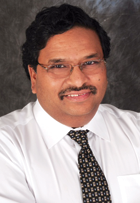 |
Indresh K. Srivastava, PhD
Vice President, Product Realization, Protein Sciences
Dr. Srivastava joined Protein Sciences in 2012 as Vice President, Product Realization. He has a strong background in vaccine development, particularly in immunogen design, purification, analytical and formulation development, and has published extensively in these areas. Dr. Srivastava served on the NIH special emphasis study section focused on vaccine development for ten years, and in 2011 he co-edited the book, “Development of Vaccines: From Discovery to Clinical Testing.” Previously, Dr. Srivastava spent more than twelve years at Chiron Corporation/Novartis Vaccines and Diagnostics, Inc. in various capacities, including Head (AI), Protein Biochemistry; Head, Vaccine Manufacturing; and Head, Protein Expression and Analytics. He also spent about two years at the Vaccine Research Center, a division of the National Institute of Allergy and Infectious Diseases, where he led the purification, analytical and formulation development of vaccine candidates for clinical evaluation. Prior to joining the biotechnology industry, Dr. Srivastava was an Assistant Professor of Research in Microbiology and Immunology at the Medical College of Pennsylvania. He holds a PhD from the Kanpur University, India and completed his post-doctoral training with Prof. Luc Perrin at the Hospital Cantonal, University of Geneva, Switzerland. |
 |
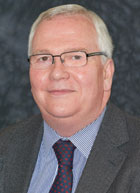 |
Martin Wisher, PhD
Senior Director, Quality Assurance & Regulatory Affairs, BioReliance
Dr. Wisher has more than 30 years of experience in biosafety testing and validation. He has worked for BioReliance, UK since the company was founded in Stirling in 1990, acting as Scientific Director since 1993. He has extensive experience in the technical, scientific, quality and regulatory aspects of the development of biological products including vaccines and viral vectors and provides consultancy in these areas. Prior to joining BioReliance, Dr. Wisher worked for Inveresk Research as Manager of Immunology, responsible for biosafety services. He obtained a PhD in membrane biochemistry from the National Institute for Medical Research, London and prior to moving to the contract research industry was involved in research on membrane receptors, monoclonal antibodies and recombinant vaccines. |
 |
|
|
|